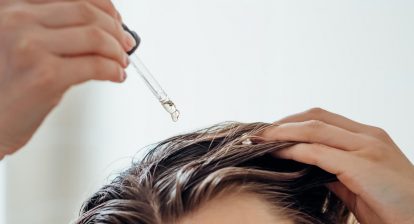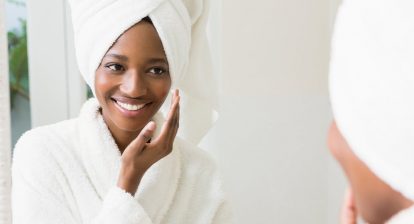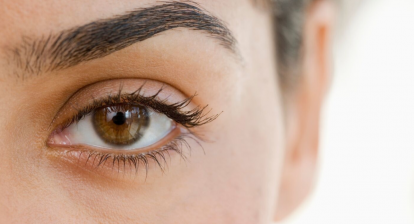When it comes to maintaining healthy-looking hair and caring for your scalp, there are so many products and DIY treatments to choose from. It can be difficult to decipher which are viral but baseless trends versus those that can truly deliver stellar hydrating, soothing, and strengthening results for your strands.
While castor oil has long been touted as being beneficial for hair, it’s important to know if it’s right for your specific hair and scalp and the best way to incorporate it into your hair-care routine. That’s why we asked a range of hair experts—ranging from dermatologists, hairstylists, and trichologists—to take a deep dive into the pros (and any cons, of course) of castor oil for hair. Read on to find out more about castor oil, how it can benefit both hair and scalp, the absolute best application methods, products to try, DIY treatments, and more.
What is Castor Oil?
“Castor oil is an oil derived through cold pressing the seeds of the castor plant, which is naturally found in Africa, India, and South America,” explains Joshua Zeichner, MD, a board-certified dermatologist in New York City. And there’s a good reason it’s so noteworthy in the beauty arena for both skin and hair. “It’s loaded with ricinoleic acid, a potent antioxidant,” he notes. Plus, it also contains high concentrations of fatty acids, which naturally have emollient benefits to hydrate and soothe the skin, scalp, and hair. Surprisingly, trichologist Kerry E. Yates points out that castor beans themselves are “considered to be quite poisonous; however, when the oil is extracted from the seeds, it is no longer toxic.” That’s because when the seeds are cooked, dried, and pressed, they no longer contain the toxic compound ricin.
Benefits of Castor Oil for Hair
Getty Images
According to Richy Kandasamy, a colorist and VP of R+COLOR Development and R+Co Collective hair care, part of the reason castor oil is so beneficial to hair is its high concentration of ricinoleic acid, a type of fatty acid, “which can help stimulate blood circulation to the scalp and improve nutrient delivery to the hair follicles,” he says. “This increased blood flow and nutrient supply can potentially promote hair growth and strengthen the hair follicles.” It’s also amazing at increasing hair shine and strength because it’s such a rich emollient and can help seal strands.
“Castor oil helps nourish hair, leaving strands feeling and looking stronger and healthier,” Marisa Garshick, MD, a board-certified dermatologist in NYC and New Jersey, adds. Another benefit of castor oil is that “it contains some antimicrobial properties that can help prevent scalp infections and folliculitis, which can contribute to hair loss and in turn help hair growth,” Kandasamy explains.
Products That Contain Caster Oil
How to Use Castor Oil for Hair
Getty Images
There are various options when it comes to using castor oil for your hair and scalp, including choosing products that contain castor oil and incorporating them into your hair-care routine.
Yates says that creating an at-home natural castor oil treatment is also an easy option, and it can be used in various ways. To create a pre-shampoo treatment, she suggests applying a castor oil mixture on the mid-lengths and ends of hair to help alleviate dryness sometimes caused by shampooing super damaged ends or overprocessed hair. “This will help protect damaged ends from becoming over-dry due to the detergents found in shampoos or even the harshness of the water,” she says.
To create a natural heat protector, “apply a castor oil mixture on semi-dry ends, then heat style as normal to protect against high heat appliances and prevent frizzy results and split ends,” Yates adds.
If split ends are a hair concern, she recommends applying it on ends as the last step of the styling process to smooth cuticles and prevent splits from continuing higher up on strands.
When to Avoid Castor Oil for Hair
Getty Images
Dr. Garshick points out that although castor oil can be used by all hair types, it is especially good for those with dry hair. But the condition of your scalp plays an important role when deciding to use castor oil on your hair or not.
“If you suffer from any type of scalp conditions, including seborrheic dermatitis or a skin sensitivity, you should be cautious when using castor oil as it may worsen or irritate the area,” she says. It also matters how often you use castor oil and how well you wash it out. “Overuse and improper hair washing of castor oil may also lead to build up, which may also contribute to irritation and breakouts,” she says.
Frequently Asked Questions
-
Where and when should castor oil be applied to hair?
“Castor oil may be applied to the scalp or directly to the hair,” Dr. Garshick says. “While it can be applied to wet or dry hair, it may be preferred to apply it to damp hair.” She also recommends mixing pure castor oil with another hydrating oil. “Because castor oil seals the hair strands, castor oil may actually make the hair appear drier if the hair already lacks hydration, so it is important to hydrate the hair with other oils as well before applying the castor oil so it can seal in that hydration.”
-
How long can you leave castor oil on your hair and scalp?
Kandasamy says that when using a DIY castor oil treatment, repeat it weekly, leave it on for 30 minutes or slightly longer, and always wash it out using a clarifying shampoo. He also makes note that massaging it into the scalp is key to seeing results. “Massaging castor oil onto the scalp can help improve scalp health by reducing inflammation, soothing irritation, and balancing oil production—and a healthier scalp environment can support optimal hair growth,” he explains. If you’re using a product that contains castor oil versus a pure castor oil treatment, then follow the directions on the label.
-
Does castor oil help with hair loss?
“While there is no conclusive evidence that castor oil can promote hair regrowth, anecdotally, people have noticed improvement,” says Dr. Garshick. This is likely because castor oil has other benefits for the hair and scalp that can lead to less breakage. “Castor oil helps strengthen the hair and nourish the scalp, promoting a healthy environment for hair regrowth,” she adds. “Plus, because it has antimicrobial and antifungal properties, it may be helpful to improve overall scalp health while also offering hydrating and nourishing properties to the scalp.”
-
Can pure castor oil be used on hair?
“Because pure castor oil can be quite sticky it should not be used on its own,” says Yates, who suggests blending castor oil with another oil like jojoba or coconut oil with a ratio of one part castor oil and four parts of the other oil. Kandasamy also recommends mixing castor oil with other hair oils (he prefers coconut oil or almond oil) to balance the texture and act as a diluter to thin the consistency and make it easier to use. “Next, warm the mixture in your hands and use your fingers to massage it into your scalp,” he says. Dr. Garshick adds that because scalp sensitivity is possible, it’s best to always do a small patch test on one hair and scalp area before applying it all over.






